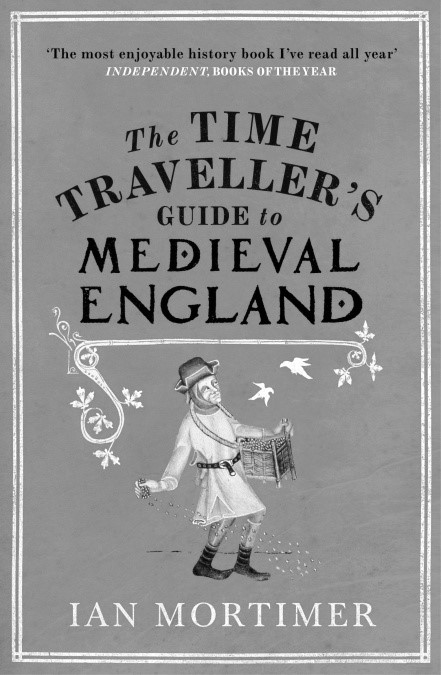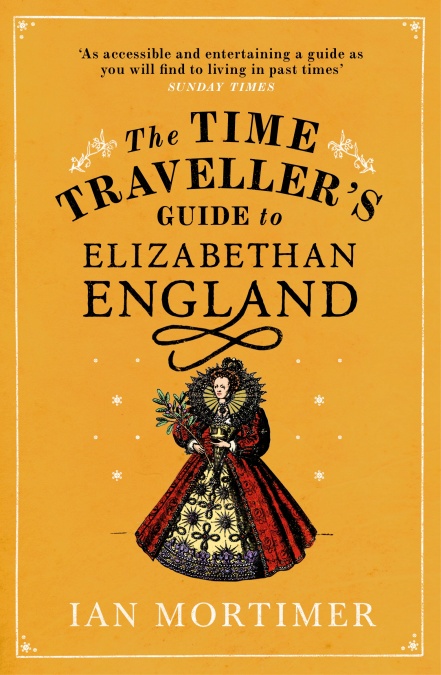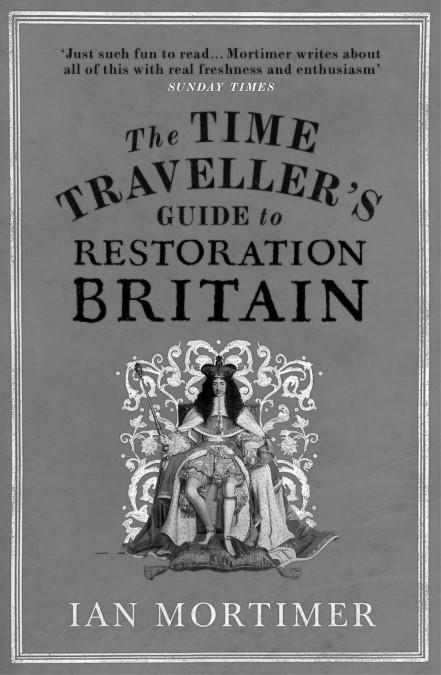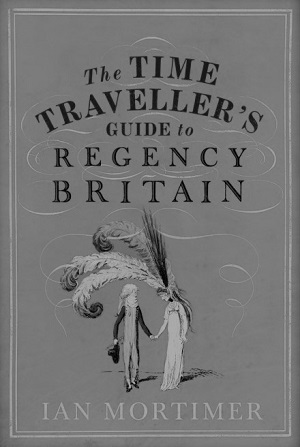|
The Time Traveller's Guide to About writing the book It seems that everyone except me was surprised by the success of the paperback of The Time Traveller's Guide to Medieval England. It did not receive a large contractual advance - quite the opposite - and only when I had written it did people start to understand why I was so committed to the project. I had always believed that the form would provide a talking point, and I am sure the key to selling a book is to write something that people want to talk about as well as read. The concept was simple enough to convey in a few words yet it was also powerful enough to change one's perspectives on what history could be. It allowed me to show - and not just claim - that we can structure our understanding of 'humanity over time' according to what we want to know, and we don't have to arrange it archivally or academically, according to dead documents or methodological approaches. We can arrange it to reflect life, and what is interesting about life. The TTGME also allowed me to demonstrate how I think historians should write about the past: by (1) researching a subject to as high a standard as possible; (2) employing all the endnotes and appendices necessary to connect the narrative with the past (and concealing all the methodology in them); (3) never forgetting that they are addressing a modern audience (and therefore automatically juxtaposing that past society with that of our own times); (4) structuring their ideas and conclusions around the reader's likely interests and natural questioning; and (5) always tempering their understanding with humour and humanity. It was not easy. Most people told me that book no. 2 would be a walk in the park because I already had the structure sorted out. They were wrong, wrong, wrong. It is easy to point out where lightning has struck once; it is very difficult to make it do it again. And then there was the small matter of the deadline. Oh, believe me, there is nothing attractive about that word. The slow tightening of the screw on your life, the pressure growing ever greater and greater. Time does not compromise. Not even historians have a chance to bargain with it. Least of all this historian. Writing this book was difficult for other reasons. A little research revealed that people know a LOT more about Elizabethan England than they do about the fourteenth century. The medieval period in the public imagination is almost entirely a tapestry of knights, peasants, battles, castles, monks, nuns, wimples, the advantages of a three-field system over a two-field one, crusades, cathedrals, The Canterbury Tales and the Black Death. Common knowledge of the Elizabethan period starts with Shakespeare and gets progressively more sophisticated after that. I had to correct myths and falsehoods as well as explain how to dress, where to stay etc. This in turn raised another question: how do you keep the humour and humanity if you are obliged to be more scholarly? If you have to raise the historical bar, how do you ensure the end result remains as accessible? The first thing I did was to buy some Elizabethan coins. A few years earlier, when writing The Perfect King, my wife had given me a groat minted in the 1350s. It struck me in handling it how it must have been used to pay for many things - bread and wine, beer and cheese, tools and trinkets, artisan objects and luxuries, work and sex. It might even have been used to pay for a house. It had threaded itself like a needle pulling an invisible thread through the purses and pockets of people in all walks of life, finally coming to settle in my hand. So I went online and bought a shilling and a sixpence. Nothing special: these had to show signs of being well used. But I wanted also to see the Elizabethan craftsmanship, so they couldn't be in too bad a shape. I also came across an Elizabethan halfpenny, a tiny coin, which was inspirational. What had that been used for that the others hadn't? And vice versa? What satisfaction lay for a boy in holding a shilling, the equivalent of a day's wages for a skilled worker? With my purse of 18½ old pence, I sat in my study and contemplated a journey of 450 years. 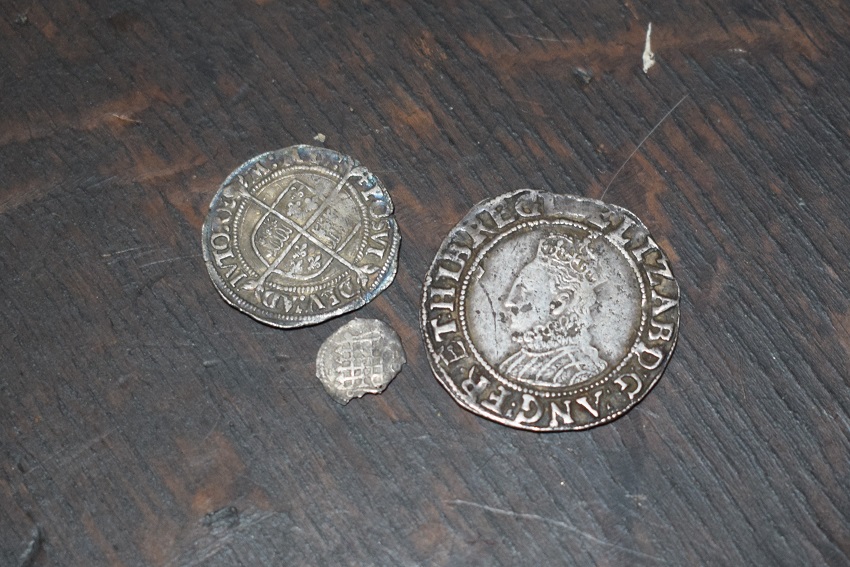 I don't think there was ever a moment after that when I wondered what to do. This book had to be more than the first one in every way. It had to be more detailed, more diverse, more sincere and, above all else, more meaningful. I can distinctly recall struggling to find an opening image and then reading Professor Alexandra Walsham's 'Frantic Hackett' article, and downloading the contemporary source material that same day, knowing I had found my way in: through the apparent contradictions in Elizabethan society. I also remember a moment when I realised I was repeating some of the things that I had already written in the medieval guide, and knew that the only explanation for making the same observations about Elizabethan and medieval England was that these were things I myself particularly wanted to say to an audience. I was the common denominator. It followed that this book reflected my knowledge of modern society and human nature - it was not just about the past. The pressure was considerable. If everyone is telling you your book is bound to be a success, then there is every chance it won't be. At such times you need to shoot every optimist on sight. What you need are people who will keep your feet on the ground and tell you that you haven't got a chance of writing another book that people will want to talk about. In fact you're doomed. Love thy critics; keepeth thy fans at arm's length. You have to learn again how to grovel. Having said all that, writing this book was huge fun. I thoroughly enjoyed it. I loved having the evidence that allowed me to present new views of Tudor society. The sections on smells and cleanliness were years in the making: my approach to these subjects grew out of some research I did in the late nineties. The medical sections drew on my PhD work (2002-4). I had fun writing about other things too, not just my special subjects. I rejoiced in the 'science' of dream interpretation, John Dee's vision for a British Empire, life aboard ships, Simon Forman's scandalous approach to his female patients, the new architecture, gardens, glass, Sir William Cecil's incredible range of interests, how atheism developed, Elizabethan animal cruelty, racism - so many things. At one point, having completed chapter 4, I made a dreadful mistake. I saved the plan over the top of the document - and, before I realised, I had repeated the mistake over my whole backup system. I lost half of that 20,000-word chapter. I was distraught. I pulled hair out, literally (and I didn't have much to start with). I was already behind schedule... I had my laptop dismantled and the hard drive searched for fragments of chapter 4, to no avail. So I had to rewrite the lost sections. In so doing I realised how superficial my comments on racism were. I scrubbed that section too, and started again. Eventually I did recover the original version (from an extra backup copy I had forgotten about) and was able to compare the two. The lost version was better-written: the freshness of doing it just the once made all the difference. It was also better-structured with regard to science but not so good on witchcraft and racism. I took the best bits of each. I therefore lost much sleep and much time but I gained too - not just by having a better understanding of Elizabethan attitudes to sub-Saharan Africans but a better backup system as well. The historical lesson about hierarchy that this book taught me was significant. I grew to see how everything was hierarchical - not just how you dressed, what you ate and what sort of house you lived in but how you washed, how you smelled, how your house smelled, and what medicines you could obtain. I was familiar with the undercurrent of fear in the period - the awareness of living in close proximity to death, the terror of religious doubt - but I had not previously realised how fearful people were of losing their status, or the perceptions of poverty, which were also distorted by fear. It came home to me very powerfully when writing about the Norwich census of the poor. Reading the published edition of this document, I was greatly moved. I don't think of myself as occupying one point or another along the political spectrum: left or right, the person who doesn't shift from one side to the other is either an ideologist or a dogmatist. But when I read about poverty in that age, I felt a real wrench. I felt compassion for those who were forced to move on, to be homeless and to steal - so they would risk being hanged. At the same time I could not help but notice how extreme that poverty was in relation to today's spectrum of needs. People today, in this luxury-demanding, unsustainable world, do not know how lucky they are. They - we - haven't a clue. One other landmark of writing this book was the index. Normally an index for a book like this takes approximately 120 hours work - I like to provide vital dates and identifying titles and cross-references for all the people mentioned in the book: I have to do the task myself as indexers don't have the historical knowledge and array of reference works to differentiate between archbishops of Canterbury or earls of Nurthumberland. But on St Lucy's day (13 December), with eight days left to compile and edit the index (and I hadn't started it at that point), I decided to let my hair down. I had half a bottle of sherry before going out for the annual Moretonhampstead History Society dinner; I had a large gin and tonic before dinner, a lovely bottle of wine at dinner and then I met a friend in the pub. Readers of my fiction will know him as Raw Carew, the pirate who features in the second Clarenceux novel, The Roots of Betrayal. We drank a few pints, then a few whiskies, and then headed back to my house to drink an unopened bottle of Black Label, and then a bottle of Jameson's... Next morning, as I tried to muster the troops of thought from the barracks of unconsciousness, I asked myself, 'why did I do it? Indexing is much, much easier when sober.' And suddenly sobriety seemed like a Holy Grail in front of my eyes. A Grail-shaped beacon, like in Monty Python's film. I didn't drink for another two months. Now I realise that my blow-out was a reaction to the pressure of writing the book. We all have our own ways of dealing with these things. It has been an amazing journey, from the first conception of the Time Traveller's Guides sequence at the end of 1994 to now. As I commented in the first guide, I met my wife through the idea, and now have three children. I've learnt much, I've worked hard, and although the books are far from perfect, I've given them my all. Today The Time Traveller's Guide to Elizabethan England is published. Now I get to find out whether 'giving it my all' is enough. Ian Mortimer, 29 February 2012 |
